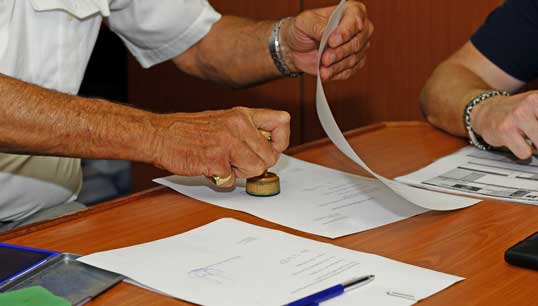- Topics
- Campaigning
- Careers
- Colleges
- Community
- Education and training
- Environment
- Equality
- Federation
- General secretary message
- Government
- Health and safety
- History
- Industrial
- International
- Law
- Members at work
- Nautilus news
- Nautilus partnerships
- Netherlands
- Open days
- Opinion
- Organising
- Podcasts from Nautilus
- Sponsored content
- Switzerland
- Technology
- Ukraine
- United Kingdom
- Welfare

You should never start work on a ship without a written contract. The best guarantee of proper conditions of employment at sea is to only sign a contract drawn up in accordance with an International Transport Workers' Federation (ITF)-approved collective agreement. Failing that, the ITF has drawn up the following checklist you can consult
Check if the contract you are signing refers to a collective bargaining agreement (CBA). If so, make sure that you are fully aware of the terms of that CBA, and keep a copy of it along with your contract.
Never sign a blank contract, or a contract that binds you to any terms and conditions that are not specified or that you are not familiar with.
Make sure that the duration of the contract is clearly stated. Don't sign a contract that allows for alterations to be made to the contractual period at the sole discretion of the shipowner.
Always ensure that the contract clearly states the basic wages payable and make sure that the basic working hours are clearly defined. The International Labour Organization (ILO) states that basic working hours should be a maximum of 48 per week (208 per month).
Make sure that the contract clearly stipulates how overtime will be paid and at what rate. There could be a flat hourly rate payable for all hours worked in excess of the basic. There may be a monthly fixed amount for a guaranteed number of overtime hours, in which case the rate for these hours should be clearly stated. The ILO states that all overtime hours should be paid at a minimum of 1.25x the normal rate.
Make sure that the contract clearly states how many days' paid leave per month you will get. This should not be less than 30 days per year (2.5 per calendar month).
Make certain that the payments for basic wages, overtime and leave are clearly and separately itemised in the contract.
Check that your contract states you are entitled to the costs of repatriation. Never sign a contract that contains any clause stating you are responsible for paying any portion of joining or repatriation expenses.
Don't sign a contract that allows the shipowner to withhold or retain any portion of your wages during the period of the contract. You should be entitled to full payment of wages earned at the end of each calendar month.
An individual employment contract will not always include details of additional benefits. Therefore, try to obtain confirmation (preferably in the form of a written agreement or contractual entitlement) of what compensation will be payable in the event of:
- sickness or injury during the contractual period
- death (amount payable to next of kin)
- loss of the vessel
- loss of personal effects resulting from loss of the vessel
- premature termination of the contract
Remember – any contract that you enter into voluntarily will be considered legally binding in most jurisdictions.
Don't sign a contract that contains any clause that restricts your right to join, contact, consult with or be represented by a trade union of your choice.
Ensure that you are given and retain a copy of the contract you have signed.
Check the conditions for terminating your contract, including how much notice the shipowner must give you.
Keep copies of your contract, payslips and other correspondence from the shipowner and manning agent that relate to your conditions of employment, even after you have finished working on the vessel. You will need these as evidence if you need to make a claim for wages or compensation.
Tags
